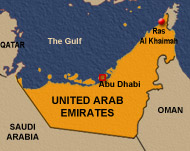Gulf states brace for winter bird influx
As migrating waterfowl begin winging their way towards the warmth of the Middle East, the UAE, with a long coastline and wetlands that host millions of wintering birds, is braced for the arrival of ducks and geese carrying the dreaded bird flu virus.

“We can’t sleep, I’m telling you,” says Majid Al Mansouri, who heads the country’s bird flu campaign. “Hamdulillah [Thanks God], we don’t have bird flu.”
The UAE government has enlisted a special weapon: the legions of expatriate bird watchers on the lookout for the 300 species and two million migrating birds that spend time in the region.
Half a million birds winter in the UAE every year, from enormous eagles to tiny warblers.
The rest pass through on their way from Siberia and Central Asia to southern Africa.
“We’re keeping an eye on the birds coming in so we can report on any that are sick and dying,” said Peter Hellyer a bird enthusiast with the Emirates Bird Records Committee.
Culling order
Government inspectors have already fanned out to check poultry farms, halt the sale of live chickens and force people who own a few chickens or ducks to slaughter and eat them now or hand them over to be culled.
Al Mansouri said many had already been killed.
The country, like others in the Gulf, has imported tons of disinfectant and millions of doses of vaccine.
 |
|
Sandy beaches and salt marshes |
The H5N1 bird flu strain is easily spread among birds, but difficult for humans to contract.
Scientists are worried, however, the strain could trigger a pandemic by mutating into a form easily transmitted between humans.
In the UAE, there has already been cause for concern.
Earlier this week, five rare Socotra Cormorants were found dead on the coast of the northern Ras al-Khaimah emirate.
And on Thursday the corpse of a Honey Buzzard turned up in Abu Dhabi. All appeared to have died from natural causes, Al Mansouri and Hellyer said.
Potential hotspots
Al Mansouri’s Environmental Agency of Abu Dhabi has identified about a dozen potential hotspots in the UAE where humans, migratory birds and domestic birds such as chickens live in close contact.
These are the sandy islands and salt marshes strung out along the coast of the emirates of Abu Dhabi, Ras al-Khaimah and Fujairah; the Dubai Creek and Al-Warsen lakes in Dubai; the Khor al-Beidah lagoon in Umm al-Quwain emirate; and avian stopovers in the desert oasis city of Al Ain.
 |
|
Expatriate bird watchers are on |
Other countries in the Middle East have also been jolted into action, stockpiling vaccine, banning poultry and live bird imports, and going on high alert.
The H5N1 strain of bird flu has devastated poultry stocks and killed dozens of people in Asia and spread to Europe.
Now the birds blamed for bringing H5N1 to Turkey are heading across the Middle East into Africa.
Neighbouring Oman hosts similar numbers of migratory birds, Hellyer said.
Specific species attract particular concern. One is the Great Black-Headed Gull, due to arrive in early December from East Asia, Hellyer said.
“They’re believed to be carriers,” he said. “We would like to catch some when they get here.”
Dying reports
Bird watchers are also monitoring migrant ducks, including the Common Teal, now arriving from Iran, Iraq, Turkey and Central Asia, including regions where H5N1 made recent appearances.
Reports of sick and dying Teal in northern Iran this week caused a scare, but tests found no signs of H5N1.
 |
|
The H5N1 bird flu strain is said to |
Elsewhere in the region, Kuwait, Bahrain, Oman and Saudi Arabia are enacting similar measures, inspecting farms and banning poultry imports.
Kuwait and Lebanon are seeking a ban on hunting of birds. All are preparing public-awareness campaigns.
“We are trying our best to vaccinate our bird population here,” said Sameer Khalfan at the Health Ministry in Bahrain, an island nation visited by more than 200 species of migrating birds.
Kuwait has not vaccinated flocks, but will when the disease appears.
The Ministry of Public Health is retooling plans prepared during the 2003 invasion of Iraq for dealing with biological or chemical weapons.
Regionwide efforts
Elsewhere, countries are taking similar measures. Sudan has banned all poultry imports and says it has large quantities of medicine to treat bird flu in humans.
Syria, which borders Turkey, instituted an import ban and has stockpiled medicine. It is publishing guidelines on cooking chicken and the need to isolate infected animals.
Israeli and Jordanian veterinary officials were to meet on Thursday to plan to combat the flu.
 |
|
Appearance of bird flu in Turkey |
Israel has said it will respond to an outbreak by culling all poultry within three kilometres of a confirmed case and vaccinating birds within a 10km radius.
Jordan already is planning to disinfect poultry farms.
Lebanon is advising municipalities to empty artificial ponds, particularly on poultry farms, so they do not attract migrating birds.
Agriculture expert Waddah Fakhri called on the government to put an end to the smuggling of live poultry and chicken meat from Syria.
“Now that bird flu has appeared in Turkey, the possibility of it being transferred to Syria is there. And consequently, smuggling poultry and meat from Syria to Lebanon poses a danger similar to the one posed by birds migrating from the north to the south through Lebanon,” Fakhri said in a statement published in local newspapers on Thursday.